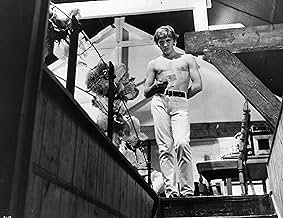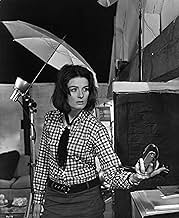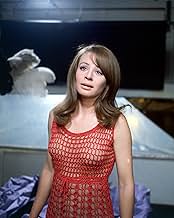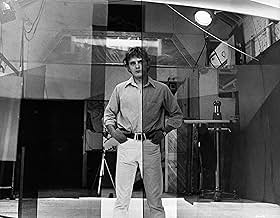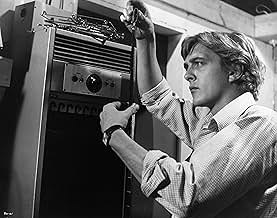Nella Londra dell'era Mod, un fotografo nota un'immagine sospetta nelle foto che ha scattato di una donna misteriosa in un parco desolato.Nella Londra dell'era Mod, un fotografo nota un'immagine sospetta nelle foto che ha scattato di una donna misteriosa in un parco desolato.Nella Londra dell'era Mod, un fotografo nota un'immagine sospetta nelle foto che ha scattato di una donna misteriosa in un parco desolato.
- Regia
- Sceneggiatura
- Star
- Candidato a 2 Oscar
- 8 vittorie e 9 candidature totali
Veruschka von Lehndorff
- Verushka
- (as Verushka)
Jeff Beck
- Self - The Yardbirds
- (non citato nei titoli originali)
Roy Beck
- Boy dancing In Ricki Tick Club
- (non citato nei titoli originali)
Charlie Bird
- Homeless Man
- (non citato nei titoli originali)
Susan Brodrick
- Antique shop owner
- (non citato nei titoli originali)
Robin Burns
- Homeless Man
- (non citato nei titoli originali)
Tsai Chin
- Thomas's receptionist
- (non citato nei titoli originali)
Julio Cortázar
- Homeless Man
- (non citato nei titoli originali)
Chris Dreja
- Self - The Yardbirds
- (non citato nei titoli originali)
Recensioni in evidenza
Blow Up is the quintessential 60' s movie with a roster of talented British actors, colourful mod fashions (now back in vogue), dreary post-war London locations and empty streets, groovy music by American composer extraordinaire Herbie Hancock and an Italian director and writer in love with the whole scene. Blow Up is the cinematic equivalent of the TR4 cabriolet, designed by Michelotti and manufactured by Triumph during the same period, and mixes the best of two rather different cultures. The movie offers the right amount of nudity, sensuality and perversion without offending the prude status quo of swinging Olde England. David Hemmings plays a character who is by all accounts snobbish, homophobic, prejudiced, rude and macho. This pseudo thriller/whodunit unwinds rather slowly and with little dialogue and, I think, is just an excuse for Antonioni to show how weird the English were. A must see flick for the ones nostalgic or who missed the 60' s completely.
I would recommend that people who are considering watching this film for the first time not read the following. I don't mention the film's ending, I just believe its far more satisfying to let the films potent details nervously sink into place on their own.
It is not about cameras. It is not about seeing. It is about our perception of our individual world. It throws shadows on the very judgments we build our lives upon. Without mentioning the obvious references to illusion (the mimes, the abstract picture of the corpse, etc.), I offer the following expert signposts Antonioni leaves for us to find.
1) The guitar neck David snatches at the rave-up has value only until he is not being chased for it, whereupon he discards it in the street. The pedestrian who then picks it up sees it only as junk.
2) Dialogue with his model friend at the pot party: DAVID - ` I thought you were in Paris.' THE GIRL - `I am'.
3) Appearances and Disappearance (2 of the many). The Lynn Redgrave character pops up as he arrives at his apartment. His question `How did you find me' is not explained. Later in the story, it is notably odd when David wakes up the following morning after the pot party that there is no one to be seen in the party house. Even the decorations like the clothes hung on the statue the night before have vanished.
4) David teaches the affectations of smoking to the woman. She must create an impression.
5) His painter friend describes his painting. `They don't mean anything to me while I work on them. Its only later that I ascribed something to them. Like this leg.' Whereupon he points out a place in a painting that might be a human leg. When he paints, he is tapping subconscious language, something apart from subjective and objective reality. Its as if Antonioni is offering us an even further vantage point to the events to come, dream reality.
6) The rambling diversion of events shows David's inability to `focus' on working through his mystery.
7) So much is hidden from the viewer. Its almost suggested that the real end to the narrative takes place someplace after the movie has already finished, jarring our sense of story, insinuating an ending we never get to `see'.
8) David announces at one point to his friend, `If only I had more money I'd be all right.'. Meanwhile he drives through the whole movie in his Rolls Royce.
This is a very remarkable film. I was irked by the pacing and the diversions as I watched it, but that was exactly why it all kept coming and coming at me for hours after until finally in bed it all rushed through me like a gorgeous musical event. I know for certain there are many more hidden corners to it, but this is what I got in my first viewing. Just that gut feeling that I missed something, I believe, is exactly where Antonioni was going. You always miss something.
It is not about cameras. It is not about seeing. It is about our perception of our individual world. It throws shadows on the very judgments we build our lives upon. Without mentioning the obvious references to illusion (the mimes, the abstract picture of the corpse, etc.), I offer the following expert signposts Antonioni leaves for us to find.
1) The guitar neck David snatches at the rave-up has value only until he is not being chased for it, whereupon he discards it in the street. The pedestrian who then picks it up sees it only as junk.
2) Dialogue with his model friend at the pot party: DAVID - ` I thought you were in Paris.' THE GIRL - `I am'.
3) Appearances and Disappearance (2 of the many). The Lynn Redgrave character pops up as he arrives at his apartment. His question `How did you find me' is not explained. Later in the story, it is notably odd when David wakes up the following morning after the pot party that there is no one to be seen in the party house. Even the decorations like the clothes hung on the statue the night before have vanished.
4) David teaches the affectations of smoking to the woman. She must create an impression.
5) His painter friend describes his painting. `They don't mean anything to me while I work on them. Its only later that I ascribed something to them. Like this leg.' Whereupon he points out a place in a painting that might be a human leg. When he paints, he is tapping subconscious language, something apart from subjective and objective reality. Its as if Antonioni is offering us an even further vantage point to the events to come, dream reality.
6) The rambling diversion of events shows David's inability to `focus' on working through his mystery.
7) So much is hidden from the viewer. Its almost suggested that the real end to the narrative takes place someplace after the movie has already finished, jarring our sense of story, insinuating an ending we never get to `see'.
8) David announces at one point to his friend, `If only I had more money I'd be all right.'. Meanwhile he drives through the whole movie in his Rolls Royce.
This is a very remarkable film. I was irked by the pacing and the diversions as I watched it, but that was exactly why it all kept coming and coming at me for hours after until finally in bed it all rushed through me like a gorgeous musical event. I know for certain there are many more hidden corners to it, but this is what I got in my first viewing. Just that gut feeling that I missed something, I believe, is exactly where Antonioni was going. You always miss something.
BLOW-UP is NOT "about the possible dehumanizing effects of photography..." but rather a movie version of the philosophical question: "If a tree falls in the forest and no one hears it, does it make a sound?"
In this case, if a murder is committed and there is no evidence, did it really happen?
While seemingly about a successful, but hedonistically superficial, photographer who films both wartime brutalities and fashion, Thomas (David Hemmings) comes to finally realize that his images only create an illusion of the real world.
He discovers that he has accidentally photographed a murder when he develops and enlarges ("blows up") the images of photographs taken of a couple in an otherwise deserted park. He even returns to the scene and finds the victim's body. But when the photographs AND the negatives AND the body disappears AND there is no report of a missing person, he discovers that he has no evidence of a murder having occurred.
In the end, when he throws back the imaginary tennis ball to the pantomime players on the tennis court, he realizes that what he accepts as reality is really only an illusion.
In this case, if a murder is committed and there is no evidence, did it really happen?
While seemingly about a successful, but hedonistically superficial, photographer who films both wartime brutalities and fashion, Thomas (David Hemmings) comes to finally realize that his images only create an illusion of the real world.
He discovers that he has accidentally photographed a murder when he develops and enlarges ("blows up") the images of photographs taken of a couple in an otherwise deserted park. He even returns to the scene and finds the victim's body. But when the photographs AND the negatives AND the body disappears AND there is no report of a missing person, he discovers that he has no evidence of a murder having occurred.
In the end, when he throws back the imaginary tennis ball to the pantomime players on the tennis court, he realizes that what he accepts as reality is really only an illusion.
I realize that this is a cinema classic, taught in cinema courses everywhere. And I recognize that there is some pretty remarkable stuff here. But some of it I found very off-putting.
First, to the good: the cinematography is almost constantly remarkable. The way scenes are framed, the constant variation of camera angles, the switches between close and far, etc. I almost would have preferred this without sound. There was so much of interest to watch.
There was little of interest to hear, however. The dialogue is inane. And the protagonist is an egotistical, selfish, thoroughly repugnant excuse for a man. Maybe he's alienated from his world. Why would I care? He does everything to demonstrate that he cares about nothing and no one but himself.
Just past the midpoint of this movie, it starts to become interesting when the photographer detects something in the background of one of his photos. When it turns out a man was murdered, he wants to know more. But why? He's never shown any interest in anything other than himself up until then?
And, finally, he seems to forget about it all.
Watch this once for the amazing camerawork. But as for the plot, the characters, and the rest, don't expect to be engaged. I certainly wasn't.
First, to the good: the cinematography is almost constantly remarkable. The way scenes are framed, the constant variation of camera angles, the switches between close and far, etc. I almost would have preferred this without sound. There was so much of interest to watch.
There was little of interest to hear, however. The dialogue is inane. And the protagonist is an egotistical, selfish, thoroughly repugnant excuse for a man. Maybe he's alienated from his world. Why would I care? He does everything to demonstrate that he cares about nothing and no one but himself.
Just past the midpoint of this movie, it starts to become interesting when the photographer detects something in the background of one of his photos. When it turns out a man was murdered, he wants to know more. But why? He's never shown any interest in anything other than himself up until then?
And, finally, he seems to forget about it all.
Watch this once for the amazing camerawork. But as for the plot, the characters, and the rest, don't expect to be engaged. I certainly wasn't.
BLOW-UP is the story of a successful fashion photographer, Thomas (David Hemmings), who, whilst scouting for fresh subjects in a park one afternoon, photographs a mysterious couple in 'flagrante delicto.' Upon returning to his studio loft later that day, he develops the pictures and discovers that he has inadvertently stumbled upon a murder. Antonioni is not interested in the details of the murder itself, as in a typical detective story, but rather with how the protagonist's perception of the world, and his relationship to it, is altered by this event.
As a fashion photographer, Thomas is a creator of illusions that define a certain kind of young urban lifestyle and Antonioni's flagrant use of the loud, splashy, attention-grabbing colors of billboard advertising -- a visual association elevated to an unholy apotheosis in his next film, ZABRISKIE POINT (1970) -- brings to the surface the transient sensation and hollow artifice that lies at the heart of all pop culture consumerism. In his previous work, RED DESERT (1964), Antonioni spray-painted both the man-made décor as well as the natural setting as a means of giving concrete expression to the heroine's neurotic state of mind and her ameliorative aestheticizing vision of a world despoiled by technology and pollution. He does the same in BLOW-UP, painting doors, fences, poles, and the façades of entire buildings to emphasize the exhilaration and alienation that characterizes life in a large modern city.
Psychedelic colors make the 'real' world of the film seem exaggerated and hyperbolic like a fantastic 'surface' reality, while the 'captured' and reconstructed world of the photographs appears ominously stark, grainy, and documentary-like -- the bare, denuded 'essence' of reality. In the central montage sequence of the film, the camera -- in place of Thomas' eyes -- slowly moves back and forth from one photograph to the next, and likewise, Antonioni cuts back and forth from the pictures to the protagonist looking at them. Since the act of looking at these enhanced images effectively reconstructs an event that the protagonist -- and the audience -- never actually saw with the naked eye in 'real life,' technology is shown to reveal a new surface of the world that is normally hidden from view. Antonioni's own particular brand of phenomenological Neorealism is concerned primarily with the process of seeing through a camera as a way of exposing an ultimate truth, or a lack thereof, that underlies the surface of the world.
The curious self-reflexivity of this scene is an epistemological hall of mirrors: Antonioni's camera looks at Thomas looking at photographs which are blown up larger and larger so that eventually they become merely an abstract collection of dots, a Rorschach test in which almost anything can be read. Like the Abstract Expressionist paintings of the tormented artist son in Pasolini's TEOREMA (1968), the received cultural baggage and semiotic referentiality of the image is eliminated until all that remains is purest subjectivity of the spectator. And so, picture-making technology mediates reality only up to a point: once the threshold of referentiality has been crossed, the suspicion of a murder in the park gleaned from a series of enlarged photographs would seem to say more about Thomas' own paranoid state of mind than what his camera may or may not have recorded.
This subtextual aspect of the film has been compared to the controversy surrounding the various interpretations of the Abraham Zapruder film as a definitive and reliable record of the Kennedy assassination -- and particularly, the mystery of the notorious 'grassy knoll.' Also, the possible incidence of adultery and The Girl's desperate efforts to retrieve the film suggest the scandalous fallout of the Profumo affair. Vanessa Redgrave, with her thick, dark brown hair and affected temptress-naïf manner, hinted at by a schoolgirl outfit and arms folded seductively over her breasts, seems meant to evoke, for a British audience at least, then-recent memories of Christine Keeler.
BLOW-UP is full of visual and verbal non-sequiturs and nearly all the scenes are composed of long-takes with plenty of 'longeurs' and 'temps mort.' This real-time approach -- often fragmented by abrupt and seemingly arbitrary cuts -- faithfully simulates Thomas' experience and the mechanical routine of his creative process and its fleeting moments of sudden inspiration and frenzied excitement. All throughout the film there is a recurrent pattern of relationships left unconsummated and work left undone. Just as he appears on the verge of establishing meaningful contact with someone or about to finally resolve himself to some efficacious deed or another, he is immediately distracted by something else that pops up.
Thomas resembles Odysseus in the way he is continually thwarted by chance encounters, which cause him to lose sight of his mission. Indeed, the film's meandering, episodic plot does seem to have elements of classical epic: the rock concert and the marijuana party afterward all suggest a ritual journey through a modern 'Land of the Lotus-Eaters.' Ironically, it is just when he discovers a sense of emotional commitment and social obligation in his life that his self-justifying cynicism and arrogant indifference toward others is replaced by a growing sense of impotence and defeat. In the final scene, speech is phased out of the film entirely, leaving only a silent form of physical communication unmediated by language and social pretensions.
BLOW-UP was the Antonioni's greatest commercial and critical triumph and the film's narrative -- an odyssey through a modern city, following the protagonist from feigned poverty to the false security of wealth and ending on a note of final lingering doubt about one's place and purpose in the world -- seems itself a trenchant comment on the nature of success and what it does to people. By transposing to 'Swinging London' the Marxist concerns of his Italian films, Antonioni demonstrates once again that this malaise of modern life is not caused by technology and consumer culture but rather by man's failure to adapt to the conditions of the new environment he has created for himself.
As a fashion photographer, Thomas is a creator of illusions that define a certain kind of young urban lifestyle and Antonioni's flagrant use of the loud, splashy, attention-grabbing colors of billboard advertising -- a visual association elevated to an unholy apotheosis in his next film, ZABRISKIE POINT (1970) -- brings to the surface the transient sensation and hollow artifice that lies at the heart of all pop culture consumerism. In his previous work, RED DESERT (1964), Antonioni spray-painted both the man-made décor as well as the natural setting as a means of giving concrete expression to the heroine's neurotic state of mind and her ameliorative aestheticizing vision of a world despoiled by technology and pollution. He does the same in BLOW-UP, painting doors, fences, poles, and the façades of entire buildings to emphasize the exhilaration and alienation that characterizes life in a large modern city.
Psychedelic colors make the 'real' world of the film seem exaggerated and hyperbolic like a fantastic 'surface' reality, while the 'captured' and reconstructed world of the photographs appears ominously stark, grainy, and documentary-like -- the bare, denuded 'essence' of reality. In the central montage sequence of the film, the camera -- in place of Thomas' eyes -- slowly moves back and forth from one photograph to the next, and likewise, Antonioni cuts back and forth from the pictures to the protagonist looking at them. Since the act of looking at these enhanced images effectively reconstructs an event that the protagonist -- and the audience -- never actually saw with the naked eye in 'real life,' technology is shown to reveal a new surface of the world that is normally hidden from view. Antonioni's own particular brand of phenomenological Neorealism is concerned primarily with the process of seeing through a camera as a way of exposing an ultimate truth, or a lack thereof, that underlies the surface of the world.
The curious self-reflexivity of this scene is an epistemological hall of mirrors: Antonioni's camera looks at Thomas looking at photographs which are blown up larger and larger so that eventually they become merely an abstract collection of dots, a Rorschach test in which almost anything can be read. Like the Abstract Expressionist paintings of the tormented artist son in Pasolini's TEOREMA (1968), the received cultural baggage and semiotic referentiality of the image is eliminated until all that remains is purest subjectivity of the spectator. And so, picture-making technology mediates reality only up to a point: once the threshold of referentiality has been crossed, the suspicion of a murder in the park gleaned from a series of enlarged photographs would seem to say more about Thomas' own paranoid state of mind than what his camera may or may not have recorded.
This subtextual aspect of the film has been compared to the controversy surrounding the various interpretations of the Abraham Zapruder film as a definitive and reliable record of the Kennedy assassination -- and particularly, the mystery of the notorious 'grassy knoll.' Also, the possible incidence of adultery and The Girl's desperate efforts to retrieve the film suggest the scandalous fallout of the Profumo affair. Vanessa Redgrave, with her thick, dark brown hair and affected temptress-naïf manner, hinted at by a schoolgirl outfit and arms folded seductively over her breasts, seems meant to evoke, for a British audience at least, then-recent memories of Christine Keeler.
BLOW-UP is full of visual and verbal non-sequiturs and nearly all the scenes are composed of long-takes with plenty of 'longeurs' and 'temps mort.' This real-time approach -- often fragmented by abrupt and seemingly arbitrary cuts -- faithfully simulates Thomas' experience and the mechanical routine of his creative process and its fleeting moments of sudden inspiration and frenzied excitement. All throughout the film there is a recurrent pattern of relationships left unconsummated and work left undone. Just as he appears on the verge of establishing meaningful contact with someone or about to finally resolve himself to some efficacious deed or another, he is immediately distracted by something else that pops up.
Thomas resembles Odysseus in the way he is continually thwarted by chance encounters, which cause him to lose sight of his mission. Indeed, the film's meandering, episodic plot does seem to have elements of classical epic: the rock concert and the marijuana party afterward all suggest a ritual journey through a modern 'Land of the Lotus-Eaters.' Ironically, it is just when he discovers a sense of emotional commitment and social obligation in his life that his self-justifying cynicism and arrogant indifference toward others is replaced by a growing sense of impotence and defeat. In the final scene, speech is phased out of the film entirely, leaving only a silent form of physical communication unmediated by language and social pretensions.
BLOW-UP was the Antonioni's greatest commercial and critical triumph and the film's narrative -- an odyssey through a modern city, following the protagonist from feigned poverty to the false security of wealth and ending on a note of final lingering doubt about one's place and purpose in the world -- seems itself a trenchant comment on the nature of success and what it does to people. By transposing to 'Swinging London' the Marxist concerns of his Italian films, Antonioni demonstrates once again that this malaise of modern life is not caused by technology and consumer culture but rather by man's failure to adapt to the conditions of the new environment he has created for himself.
Lo sapevi?
- QuizThe film contains a rare performance of The Yardbirds during the period when Jimmy Page and Jeff Beck were both in the band. Jeff Beck would leave a few months later.
- BlooperWhen Thomas is frolicking with the two girls on the purple paper backdrop in the studio, two crew members, including a camera operator, can be seen just sitting there in the top right side of the frame.
- Versioni alternativeSome of the music was rescored for the Warner DVD release, namely the latter part of the opening title music. The VHS releases' music remain intact.
- ConnessioniFeatured in Film Review: How I Learned to Live with Being a Star (1967)
- Colonne sonoreMain Title (Blow-Up)
Written and Performed by Herbie Hancock
I più visti
Accedi per valutare e creare un elenco di titoli salvati per ottenere consigli personalizzati
- How long is Blow-Up?Powered by Alexa
Dettagli
- Data di uscita
- Paesi di origine
- Sito ufficiale
- Lingua
- Celebre anche come
- Deseo de una mañana de verano
- Luoghi delle riprese
- Maryon Park, Woolwich Road, Charlton, Londra, Inghilterra, Regno Unito(scenes where Thomas first photographs Jane and where mime artists play tennis at the end)
- Aziende produttrici
- Vedi altri crediti dell’azienda su IMDbPro
Botteghino
- Budget
- 1.800.000 USD (previsto)
- Lordo in tutto il mondo
- 38.575 USD
- Tempo di esecuzione
- 1h 51min(111 min)
- Mix di suoni
- Proporzioni
- 1.85 : 1
Contribuisci a questa pagina
Suggerisci una modifica o aggiungi i contenuti mancanti



